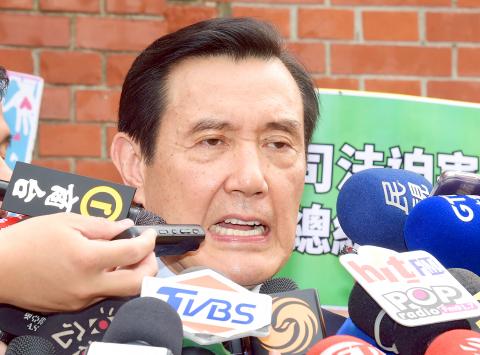Former president Ma Ying-jeou (馬英九) yesterday vowed to appeal a decision by the Taiwan High Court to convict him of leaking classified information, saying that he aims to not only defend his rights, but also to seek clarification on the boundaries of the presidential mandate.
“As [yesterday’s] ruling reached a different conclusion than the three previous verdicts, we need to clarify this issue,” Ma said in response to reporters’ questions on the sidelines of a public event in Taipei.
The case is essentially litigating constitutional matters, Ma said, adding that he has to fight not only for his own rights, but also to ensure that the mandate of the nation’s presidents will not be restricted.

Photo: Huang Yao-cheng, Taipei Times
“I will definitely appeal the ruling,” Ma said while surrounded by scores of supporters, some of whom waved Republic of China flags and held cardboard posters that read: “Oppose political persecution.”
Asked whether the guilty verdict was associated with Control Yuan member Chen Shih-meng’s (陳師孟) pledge in January to focus on Ma and judges who appear lenient toward the pan-blue camp, Ma said that the public would have its own judgement on the matter.
He also struck back at the court’s ruling, which sentenced him to four months in prison for leaking information regarding an ongoing investigation and said that he failed to set a good example for society as the democratically elected head of state.
“Failing to set a good example would be if I chose to go home and take a nap while facing this case,” Ma said.
Yesterday’s ruling was the second verdict in a case filed by the Taipei District Prosecutors’ Office and can still be appealed. Ma was acquitted in the first ruling in August last year.
The case was derived from an incident in September 2013, when Ma gave then-premier Jiang Yi-huah (江宜樺) and then-Presidential Office deputy secretary-general Lo Chih-chiang (羅智強) wiretapped conversations gathered as part of an ongoing investigation into alleged lobbying by Democratic Progressive Party caucus whip Ker Chien-ming (柯建銘).
Ma claimed his actions were an attempt to assuage the scandal’s potential effects on the relationship between the Executive Yuan and the Legislative Yuan, as it also implicated then-legislative speaker Wang Jin-pyng (王金平) and then-minister of justice Tseng Yung-fu (曾勇夫), prosecutors said.
In his defense, Ma cited Article 44 of the Constitution, which affords the president the right to provide consultations on a dispute involving two or more branches of the government.
Ma was last year acquitted in two rulings on a case filed by Ker, one in March and the other in October.
Yesterday’s ruling “has raised concerns about whether Chen’s remarks have caused a chilling effect in the judicial community,” Ma’s office spokeswoman Hsu Chiao-hsin (徐巧芯) said, adding that Ma did what any responsible president would have done to prevent a potential constitutional crisis.
Expressing the Chinese Nationalist Party’s (KMT) regret over the verdict, Culture and Communications Committee director-general Lee Ming-hsien (李明賢) said in a statement that the ruling has misinterpreted the law and humiliated a former president.

US President Donald Trump said "it’s up to" Chinese President Xi Jinping (習近平) what China does on Taiwan, but that he would be "very unhappy" with a change in the "status quo," the New York Times said in an interview published yesterday. Xi "considers it to be a part of China, and that’s up to him what he’s going to be doing," Trump told the newspaper on Wednesday. "But I’ve expressed to him that I would be very unhappy if he did that, and I don’t think he’ll do that," he added. "I hope he doesn’t do that." Trump made the comments in

Japanese footwear brand Onitsuka Tiger today issued a public apology and said it has suspended an employee amid allegations that the staff member discriminated against a Vietnamese customer at its Taipei 101 store. Posting on the social media platform Threads yesterday, a user said that an employee at the store said that “those shoes are very expensive” when her friend, who is a migrant worker from Vietnam, asked for assistance. The employee then ignored her until she asked again, to which she replied: "We don't have a size 37." The post had amassed nearly 26,000 likes and 916 comments as of this

Tourism in Kenting fell to a historic low for the second consecutive year last year, impacting hotels and other local businesses that rely on a steady stream of domestic tourists, the latest data showed. A total of 2.139 million tourists visited Kenting last year, down slightly from 2.14 million in 2024, the data showed. The number of tourists who visited the national park on the Hengchun Peninsula peaked in 2015 at 8.37 million people. That number has been below 2.2 million for two years, although there was a spike in October last year due to multiple long weekends. The occupancy rate for hotels

A cold surge advisory was today issued for 18 cities and counties across Taiwan, with temperatures of below 10°C forecast during the day and into tonight, the Central Weather Administration (CWA) said. New Taipei City, Taipei, Taoyuan and Hsinchu, Miaoli and Yilan counties are expected to experience sustained temperatures of 10°C or lower, the CWA said. Temperatures are likely to temporarily drop below 10°C in most other areas, except Taitung, Pingtung, Penghu and Lienchiang (Matsu) counties, CWA data showed. The cold weather is being caused by a strong continental cold air mass, combined with radiative cooling, a process in which heat escapes from